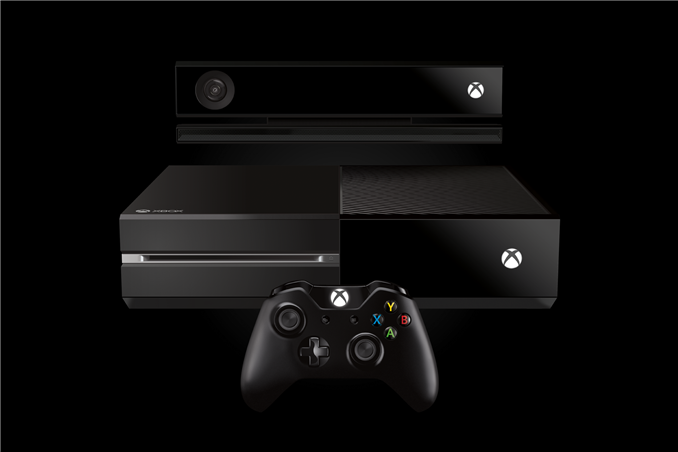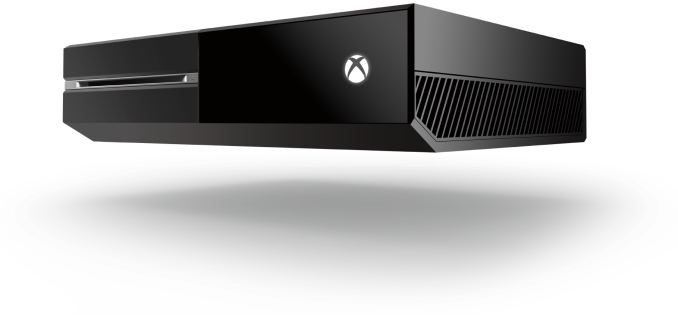The Xbox One: Hardware Analysis & Comparison to PlayStation 4
by Anand Lal Shimpi on May 22, 2013 8:00 AM EST
It’s that time of decade again. Time for a new Xbox. It took four years for Microsoft to go from the original Xbox to the Xbox 360. The transition from Xbox 360 to the newly announced Xbox One will take right around 8 years, and the 360 won’t be going away anytime soon either. The console business demands long upgrade cycles in order to make early investments in hardware (often sold at a loss) worthwhile. This last round was much longer that it ever should have been, so the Xbox One arrives to a very welcoming crowd.
Yesterday Microsoft finally took the covers off the new Xbox, what it hopes will last for many years to come. At a high level here’s what we’re dealing with:
- 8-core AMD Jaguar CPU
- 12 CU/768 SP AMD GCN GPU
- 8GB DDR3 system memory
- 500GB HDD
- Blu-ray drive
- 2.4/5.0GHz 802.11 a/b/g/n, multiple radios with WiFi Direct support
- 4K HDMI in/out (for cable TV passthrough)
- USB 3.0
- Available later this year
While Microsoft was light on technical details, I believe we have enough to put together some decent analysis. Let’s get to it.
Chassis
The Xbox 360 was crafted during a time that seems so long ago. Consumer electronics styled in white were all the rage, we would be a few years away from the aluminum revolution that engulfs us today. Looking at the Xbox One tells us a lot about how things have changed.
Microsoft isn’t so obsessed with size here, at least initially. Wired reports that the Xbox One is larger than the outgoing 360, although it’s not clear whether we’re talking about the new slim or the original design. Either way, given what’s under the hood - skimping on cooling and ventilation isn’t a good thing.
The squared off design and glossy black chassis scream entertainment center. Microsoft isn’t playing for a position in your games cabinet, the Xbox One is just as much about consuming media as it is about playing games.
In its presentation Microsoft kept referencing how the world has changed. Smartphones, tablets, even internet connectivity are very different today than they were when the Xbox 360 launched in 2005. It’s what Microsoft didn’t mention that really seems to have played a role in its decision making behind the One: many critics didn’t see hope for another generation of high-end game consoles.
With so much of today focused on mobile, free to play and casual gaming on smartphones and tablets - would anyone even buy a next-generation console? For much of the past couple of years I’ve been going around meetings saying that before consolidation comes great expansion. I’ve been saying this about a number of markets, but I believe the phrase is very applicable to gaming. Casual gaming, the advent of free to play and even the current mobile revolution won’t do anything to the demand for high-end consoles today or in the near term - they simply expand the market for gamers. Eventually those types of games and gaming platforms will grow to the point where they start competing with one another and then the big console players might have an issue to worry about, but I suspect that’s still some time away. The depth offered by big gaming titles remains unmatched elsewhere. You can argue that many games are priced too high, but the Halo, BioShock, Mass Effect, CoD experience still drives a considerable portion of the market.
The fact that this debate is happening however has to have impacted Microsoft. Simply building a better Xbox 360 wasn’t going to guarantee success, and I suspect there were not insignificant numbers within the company who felt that even making the Xbox One as much of a gaming machine as it is would be a mistake. What resulted was a subtle pivot in strategy.
The Battle for the TV
Last year you couldn’t throw a stone without hitting a rumor of Apple getting into the TV business. As of yet those rumors haven’t gone anywhere other than to point to continued investment in the Apple TV. Go back even further and Google had its own TV aspirations, although met with far less success. More recently, Intel threw its hat into the ring. I don’t know for sure how things have changed with the new CEO, but as far as I can tell he’s a rational man and things should proceed with Intel Media’s plans for an IPTV service. All of this is a round about way of saying that TV is clearly important and viewed by many as one of the next ecosystem battles in tech.
Combine the fact that TV is important, with the fact that the Xbox 360 has evolved into a Netflix box for many, add a dash of uncertainty for the future of high end gaming consoles and you end up with the formula behind the Xbox One. If the future doesn’t look bright for high-end gaming consoles, turning the Xbox into something much more than that will hopefully guarantee its presence in the living room. At least that’s what I suspect Microsoft’s thinking was going into the Xbox One. With that in mind, everything about the One makes a lot of sense.











245 Comments
View All Comments
novastar78 - Saturday, May 25, 2013 - link
I'm curious to see what feature sets each of these GPU's has. These are not the run of the mill APU's that you can buy at the store. These are both custom SoC's and it's my understanding that they may even be from different generations (7000 vs. 8000), similar to how the PS3's RSX was from the 7900 era and the Xenos was around the R600 era (Unified Architecture). Although this would be a much smaller difference here being the same make (AMD) and similar model (GCN).In the end simply measuring CU's may not be enough to determine the true power/quality of the two GPU's.
We may never know as I highly doubt they will easily divulge this info for fear of the outcry (especially from M$ standpoint).
Still i'm very curious...
epobirs - Saturday, May 25, 2013 - link
"The move away from PowerPC to 64-bit x86 cores means the One breaks backwards compatibility with all Xbox 360 titles. Microsoft won’t be pursuing any sort of a backwards compatibility strategy, although if a game developer wanted to it could port an older title to the new console. Interestingly enough, the first Xbox was also an x86 design - from a hardware/ISA standpoint the new Xbox One is backwards compatible with its grandfather, although Microsoft would have to enable that as a feature in software - something that’s quite unlikely."I would disagree. You won't see compatibility with existing Xbox discs but I very much expect a line of original Xbox titles to be offered as download purchases on the new machine. If Nintendo thinks $5 for an NES game running ont he Wii U is reasonable, Microsoft should able to make some good coin on a core set of two or three dozen Xbox titles at $10 each.
As for the 360 library, those should start turning up in HD (well, HD-ier) remakes in about four years as the market ripens for bringing those item back into circulation. This has worked very well for adding value to the PS3 with HD remake collections of PS2 hits. Given the right tools, reworking old IP can be very cost effective.
Some of the best original Xbox titles might get native remakes. We've already had Halo Anniversary and I wouldn't be surprised to see a Halo 2 Anniversary turn up for Xbox One. Jade Empire and the Knights of the Old Republic games may be worth the investment.
RedavutstuvadeR - Saturday, May 25, 2013 - link
Anand Lal Shimpi why did you not mention any thing about the four move engines in the Xbox one and the capabilities of the cloud quadrupling the Xbox ones powerRedavutstuvadeR - Saturday, May 25, 2013 - link
a link to cloud power of XB1news.softpedia.com/news/Xbox-One-Cloud-Makes-the-Console-Four-Times-More-Powerful-355818.shtml
tipoo - Monday, May 27, 2013 - link
iirc the PS4 had similar hardware blocks to the Move engines, just no fancy branding? And the cloud compute thing is a future theoretical, I'll factor it in when it's actually shown to work well. It can't be used for any latency sensitive calculations of course.slickr - Saturday, May 25, 2013 - link
http://i.imgur.com/5WXh32l.jpgjmr99 - Saturday, May 25, 2013 - link
The Xbox 1 (aka PS4 Mini aka PS4 Lite) sure is a colossal disappointment. Microsoft are trying to cut costs and save money in order to create the biggest gap they can btwn selling price and production cost. In other words, the Apple approach: rape your customers. Kudos to Sony for 1152 cores and gddr5.croc123 - Sunday, May 26, 2013 - link
Interesting article in my 'local' rag this AM...http://www.smh.com.au/digital-life/games/how-micro...
JimF2 - Wednesday, May 29, 2013 - link
I won't buy any console that needs an internet connection. It is a huge privacy risk to have a console with a camera that connects to the internet. A console that connects to the internet once per day or once per week has the same privacy risk as a console with an always-on connection.Gamers should boycott Xbox One so the console manufacturers get the message that we won't accept a required internet connection. If a physical disk is inserted in the console, no internet connection should be needed to prevent piracy. The console manufacturers just have to develop a proprietary disk format that can't be copied by Windows, Mac or Linux. It would be fine if gamers who don't want to put a physical disk in the console to prove they own the game are required to have an internet connection. That way, if a gamer wants to prevent game companies from spying on them, they would just swap disks when switching games. If a gamer uses LIVE or they want the convenience of not needing to swap disks, they would provide an internet connection.
TheEvilBlight - Wednesday, May 29, 2013 - link
The PS4's PS3 games are allegedly coming via GaiKai. I'm curious what MS will do for the old stable of games. I wonder if it would be too much to implement other VM's for the Xbox and the Xbox 360; though a VM on an x86 running PPC is likely to suffer severe penalties. It's either state or gaming from the cloud.Alternatively, developers will recompile some of the "best hits" on the 360 and re-release for the Xbox One. I wonder how that would work with the Halo series, but having Gears of War on a faster machine might be fun.